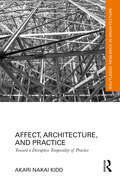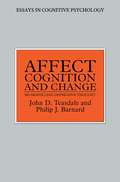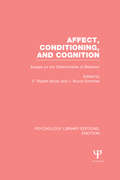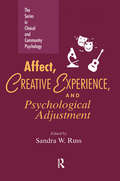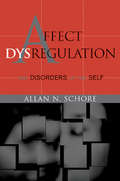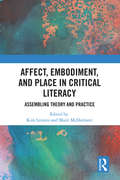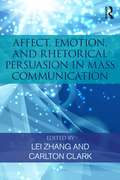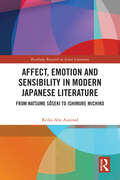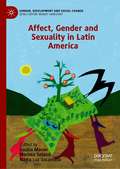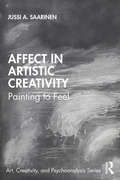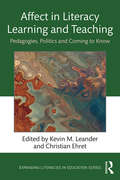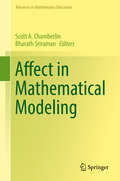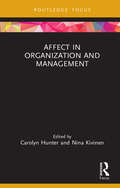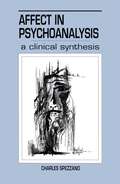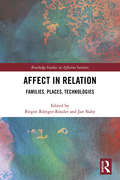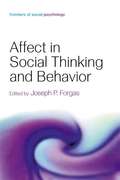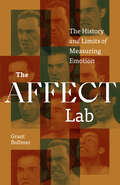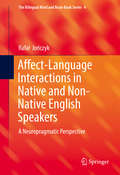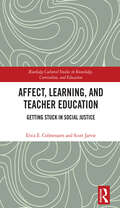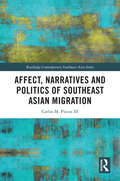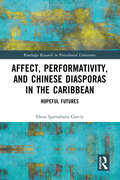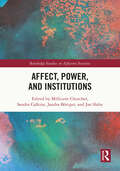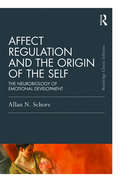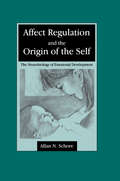- Table View
- List View
Affect, Architecture, and Practice: Toward a Disruptive Temporality of Practice (Routledge Research in Architecture)
by Akari Nakai KiddAffect, Architecture, and Practice builds on and contributes to work in theories of affect that have risen within diverse disciplines, including geography, cultural studies, and media studies, challenging the nature of textual and representational-based research. Although numerous studies have examined how affect emerges in architectural spaces, little attention has been paid to the creative process of architectural design and the role that affect plays in the many contingencies and uncertainties that arise in the process. The book traces the critical, philosophic, and architectural theories to examine how affect, architecture, and practice are interlinked. Through a series of conversations and reflections, it examines three key contemporary architects, their practices and projects, all within a single coherent theme. Reiser + Umemoto (RUR Architecture DPC), USA, Kerstin Thompson Architects, Australia, and Shigeru Ban Architects, Japan, are critically studied through the lens of different aspects of practice, namely image-making, the design process, and the making of an everyday object/material. Through this investigation, author Akari Nakai Kidd demonstrates how affect theory allows a critical interrogation of the in-betweens of practice, its liminality and limits. It questions the stability of objects, the smooth temporality of practice, and its often under-conceptualised non-human dimensions. More significantly, the book demonstrates architectural practice’s contribution to the reconceptualisation of theories of affect.
Affect, Cognition and Change: Re-Modelling Depressive Thought (Essays in Cognitive Psychology)
by John Teasdale Philip BarnardThis text, a collaboration between a clinical psychologist and a cognitive psychologist, offers a cognitive account of depression.
Affect, Conditioning, and Cognition: Essays on the Determinants of Behavior (Psychology Library Editions: Emotion)
by J. Bruce Overmier F. Robert BrushOriginally published in 1985, this title was a retrospective appreciation of the late Richard L. Solomon. His pre- and postdoctoral students from past years presented the 22 papers which are published in this volume. The book reflects the breadth of Solomon’s impact through his teaching and research. The first part contains a chapter that provides a bit of history in a retrospective appreciation of the several foci of Solomon’s research career. This chapter sets the stage for those that follow and reduces their diversity by providing a degree of historical understanding. The second part on the role of properties of fear contains chapters that address various issues associated with the role of conditioned fear. The third part contains papers that address cognitive, information-processing issues in the context of Pavlovian conditioning of appetitive and aversive events, reasoning and timing. The fourth part continues the exploration of the phenomenon of learned helplessness first discovered in Solomon’s laboratory. The fifth part addresses various issues associated with the Solomon and Corbit opponent-process theory of motivation and affect. The final part, on applications to human and cultural issues, contains chapters on such diverse subjects as cross-cultural analyses of aggressive behavior in children, the analysis of resistance to change in industrial organizations, the concept of liberty in formulating research issues in developmental psychology, and the status of free will in modern American psychology.
Affect, Creative Experience, And Psychological Adjustment (Series In Clinical And Community Psychology Ser.)
by Sandra W. RussFirst published in 1999. Routledge is an imprint of Taylor & Francis, an informa company.
Affect Dynamics
by Christian E. Waugh Peter KuppensThis book features cutting edge research on the theory and measurement of affect dynamics from the leading experts in this emerging field. Authors will discuss how affect dynamics are instantiated across neural, psychological and behavioral levels of processing and provide state of the art analytical and computational techniques for assessing temporal changes in affective experiences.In the section on Within-episode Affect Dynamics, the authors discuss how single emotional episodes may unfold including the duration of affective responses, the dynamics of regulating those affective responses and how these are instantiated in the brain.In the section on Between-episode Affect Dynamics, the authors discuss how emotions and moods at one point in time may influence subsequent emotions and moods, and the importance of the time-scales on which we assess these dynamics.In the section on Between-person Dynamics the authors propose that interactions and relationships with others form much of the basis of our affect dynamics.Lastly, in the section on Computational Models of Affect, authors provide state of the art analytical techniques for assessing and modeling temporal changes in affective experiences.Affect Dynamics will serve as a reference for both seasoned and beginning affective science researchers to explore affect changes across time, how these affect dynamics occur, and the causal antecedents of these dynamics.
Affect Dysregulation and Disorders of the Self (Norton Series on Interpersonal Neurobiology)
by Allan N. SchoreThis volume (one of two) is the first presentation of Schore's comprehensive theory in book form, as it has developed since 1994. In 1994 Allan Schore published his groundbreaking book, Affect Regulation and the Origin of the Self, in which he integrated a large number of experimental and clinical studies from both the psychological and biological disciplines in order to construct an overarching model of social and emotional development. Since then he has expanded his regulation theory in more than two dozen articles and essays covering multiple disciplines, including neuroscience, psychiatry, psychoanalysis, developmental psychology, attachment, and trauma. Affect Dysregulation and Disorders of the Self contains writings on developmental affective neuroscience and developmental neuropsychiatry. It is absolutely essential reading for all clinicians, researchers, and general readers interested in normal and abnormal human development.
Affect, Embodiment, and Place in Critical Literacy: Assembling Theory and Practice (Routledge Research in Education)
by Kim Lenters Mairi McDermottThis book explores the impact of sensation, affect, ethics, and place on literacy learning from early childhood through to adult education. Chapters bridge the divide between theory and practice to consider how contemporary teaching and learning can promote posthuman values and perspectives. By offering a posthuman approach to literacy research and pedagogy, Affect, Embodiment, and Place in Critical Literacy re-works the theory-practice divide in literacy education, to emphasize the ways in which learning is an affective and embodied process merging in a particular environment. Written by literacy educators and international literacy researchers, this volume is divided into four sections focussing on: Moving with sensation and affect; becoming worldmakers with ethics and difference; relationships that matter in curriculum and place; before drawing together everything in a concise conclusion. Affect, Embodiment, and Place in Critical Literacy is the perfect resource for researchers, academics, and postgraduate students in the fields of literacy education and philosophy of education, as well as those seeking to explore the benefits of a posthumanism approach when conceptualising theory and practice in literacy education.
Affect, Emotion, and Rhetorical Persuasion in Mass Communication
by Carlton Clark Lei ZhangThis volume examines the interplay between affect theory and rhetorical persuasion in mass communication. The essays collected here draw connections between affect theory, rhetorical studies, mass communication theory, cultural studies, political science, sociology, and a host of other disciplines. Contributions from a wide range of scholars feature theoretical overviews and critical perspectives on the movement commonly referred to as "the affective turn" as well as case studies. Critical investigations of the rhetorical strategies behind the 2016 United States presidential election, public health and antiterrorism mass media campaigns, television commercials, and the digital spread of fake news, among other issues, will prove to be both timely and of enduring value. This book will be of use to advanced undergraduates, graduate students, and active researchers in communication, rhetoric, political science, social psychology, sociology, and cultural studies.
Affect, Emotion and Sensibility in Modern Japanese Literature: From Natsume Sôseki to Ishimure Michiko (Routledge Research on Asian Literature)
by Reiko Abe AuestadThis book takes the unique approach of combining cognitive approaches with more established close-reading methods in analysing a selection of Japanese novels and a film.They are by four well-known male authors and a director (Natsume Sôseki, Shiga Naoya, Ôe Kenzaburô, Ibuse Masuji and Imamura Shôhei) and five female authors (Kirino Natsuo, Kawakami Mieko, Murata Sayaka, Tsushima Yûko, and Ishimure Michiko) from the early twentieth century up to the early millennium. It approaches the different artistic strategies that oscillate between emotional immersion and critical reflection. Inspired by new developments in cognitive theory and neuroscience, the book seeks to put a spotlight on the aspects of modern Japanese novels that were not fully appreciated earlier; the eclectic and fluid nature of the novel as a form, and the vital roles played by affects and emotions often complicated under the impact of trauma.Rejuvenating previously established cultural theories through a cognitive and emotional lens (narratology, genre theory, historicism, cultural study, gender theory, and ecocriticism), this book will appeal to students and scholars of modern literature and Japanese literature.
Affect, Gender and Sexuality in Latin America (Gender, Development and Social Change)
by Cecilia Macón Mariela Solana Nayla Luz VacarezzaThis book emphasizes the significance of affects, feelings and emotions in how we think about politics, gender and sexuality in Latin America. Considering the complex and even contradictory social processes that the region is experiencing today, many Latin American authors are turning to affect to find a key to understand our present situation, to revisit our history, and to imagine new possibilities for the future. This tendency has shown such a specificity and sometimes departure from northern productions that it compels us to focus more deeply on its own arguments, methods, and critical contributions. This volume features essays that explore the particularities of Latin American ways of thinking about affect and how they can shed new light into our understanding of, gender, sexuality and politics.
Affect in Artistic Creativity: Painting to Feel (Art, Creativity, and Psychoanalysis Book Series)
by Jussi SaarinenWhy do painters paint? Obviously, there are numerous possible reasons. They paint to create images for others’ enjoyment, to solve visual problems, to convey ideas, and to contribute to a rich artistic tradition. This book argues that there is yet another, crucially important but often overlooked reason. Painters paint to feel. They paint because it enables them to experience special feelings, such as being absorbed in creative play and connected to something vitally significant. Painting may even transform the painter’s whole sense of being. Thus, painting is not only about producing art, communicating content, and so on, but also about setting up and inhabiting an experiential space wherein highly valued feelings are interactively enabled and supported. This book investigates how and why this happens by combining psychoanalytical theorization on creativity with philosophical thinking on affectivity. It focuses on creative experience itself, and illuminates the psychological mechanisms and dynamics that underlie the affects at stake. Painters’ own descriptions of how they feel at work are used throughout to give an accurate, true-to-life portrayal of the experience of painting. The strength of the book lies in its open-minded yet critical integration of contemporary psychoanalytic and philosophical thinking, and in its truthfulness to painters’ experiential descriptions of the painterly process. On the whole, it enriches our understanding of artistic creativity and sheds more light on how and why we come to feel the things we do. As such, the book will appeal to philosophers, psychoanalysts, and art researchers alike.
Affect in Literacy Learning and Teaching: Pedagogies, Politics and Coming to Know (Expanding Literacies in Education)
by Kevin M. Leander Christian EhretIn this cutting-edge volume, scholars from around the world connect affect theory to the field of literacy studies and unpack the role and influence of this emerging area of scholarship on literacy education. Offering an introduction to affect theory and scholarship as it relates to literacy studies, contributors discuss the role of humanizing and dehumanizing influences on schooling and examine the emotional and affective dimensions at individual and communal levels. Arguing that an affective turn requires a radical rethinking of the nature of literacy, these chapters address the impact and import of emotion and affect on reading, writing and calling to action. Grounded in trailblazing research, the contributors push the boundaries of academic writing and model how theoretically-driven writing about affect must itself be moving and expressive.
Affect in Mathematical Modeling (Advances in Mathematics Education)
by Bharath Sriraman Scott A. ChamberlinIn the book, the relationship between affect and modeling is discussed because, as educational psychologists have suggested for decades, affect directly influences achievement. Moreover, given the importance of mathematical modeling and the applications to high level mathematics, it provides the field of mathematics psychology with insight regarding affect, in relation to mathematical modeling. By doing so it helps determine the degree to which understanding of mathematics and understanding affect in mathematical modeling episodes may have a direct effect on cognition.
Affect in Organization and Management (Routledge Focus on Women Writers in Organization Studies)
by Carolyn Hunter Nina KivinenAffect in Organization and Management asks how affect theory understands everyday working lives through embodied, social and political practice. Discussing a range of dimensions and perspectives on affect, the book considers how subjects are formed through their connections with others, both human and non- or more-than-human. The six women writers on affect presented in this series (Sara Ahmed, Kathleen Stewart, Donna Haraway, Jane Bennett, Karen Barad and Rosalyn Diprose) all speak to important themes in organization studies, including power, politics and ethics. Each chapter explores how these thinkers have already influenced organization scholars, as well as how their work can extend our understanding of pressing organizational issues around gender, race, the environment, leadership and ethics. Feminism is a core feature of this collection, highlighting feminist writing with affective, connected and intersubjective possibilities. Each woman writer is introduced by experts on affect and organization studies. The chapters also suggest further reading and accessible resources. The book is suitable for students, academics and practitioners in business and management, organization studies and critical management studies who want to think differently about organizations.
Affect in Psychoanalysis: A Clinical Synthesis (Relational Perspectives Book Series)
by Charles SpezzanoDrawing on the writings of Freud, Fairbairn, Klein, Sullivan, and Winnicott, Spezzano offers a radical redefinition of the analytic process as the intersubjective elaboration and regulation of affect. The plight of analytic patients, he holds, is imprisonment within crude fantasy elaborations of developmentally significant feeling states. Analytic treatment fosters the patient's capacity to keep alive in consciousness, and hence reflect on, these previously warded-off affective states; it thereby provides a second chance to achieve competence in using feeling states to understand the self within its relational landscape.
Affect in Relation: Families, Places, Technologies (Routledge Studies in Affective Societies)
by Birgitt Röttger-Rössler Jan SlabyDecades of research on affect and emotion have brought out the paramount importance of affective processes for human lives. Affect in Relation brings together perspectives from social science and cultural studies to analyze the formative, subject constituting potentials of affect and emotion. Relational affect is understood not as individual mental states, but as social-relational processes that are both formative and transformative of human subjects. This volume explores relational affect through a combination of interdisciplinary case studies within four key contexts: Part I: “Affective Families” deals with the affective dynamics in transnational families who are scattered across several regions and nations. Part II: “Affect and Place” brings together work on affective place-making in the contexts of migration and in political movements. Part III: “Affect at Work” analyzes the affective dimension of contemporary white-collar workplaces. Part IV: “Affect and Media” focuses on the role of media in the formation and mobilization of relational affect. In its transdisciplinary spirit, analytical rigor and focus on timely and salient global matters, Affect in Relation consolidates the field of affect studies and opens up new avenues for scholarly and practical co-operation. It will appeal to both students and postdoctoral researchers interested in fields such as anthropology, sociology, cultural studies, media studies and human development.
Affect in Social Thinking and Behavior (Frontiers of Social Psychology)
by Joseph P. ForgasThe role of affect in how people think and behave in social situations has been a source of fascination to laymen and philosophers since time immemorial. Surprisingly, most of what we know about the role of feelings in social thinking and behavior has been discovered only during the last two decades. Affect in Social Thinking and Behavior reviews and integrates the most recent research and theories on this exciting topic, and features original contributions reviewing key areas of affect research from leading researchers active in the area.The book covers fundamental issues, such as the nature and relationship between affect and cognition, as well as chapters that deal with the cognitive antecedents of emotion, and the consequences of affect for social cognition and behavior.This volume offers a highly integrated and comprehensive coverage of this field, and is suitable as a core textbook in advanced courses dealing with the role of affect in social cognition and behavior.
The Affect Lab: The History and Limits of Measuring Emotion
by Grant BollmerExamines how our understanding of emotion is shaped by the devices we use to measure it Since the late nineteenth century, psychologists have used technological forms of media to measure and analyze emotion. In The Affect Lab, Grant Bollmer examines the use of measurement tools such as electrical shocks, photography, video, and the electroencephalograph to argue that research on emotions has confused the physiology of emotion with the tools that define its inscription. Bollmer shows that the psychological definitions of emotion have long been directly shaped by the physical qualities of the devices used in laboratory research. To investigate these devices, The Affect Lab examines four technologies related to the history of psychology in North America: spiritualist toys at Harvard University, serial photography in early American psychological laboratories, experiments on &“psychopaths&” performed with an instrument called an Offner Dynograph, and the development of the &“electropsychometer,&” or &“E-Meter,&” by Volney Mathison and L. Ron Hubbard. Challenging the large body of humanities research surrounding affect theory, The Affect Lab identifies an understudied problem in formulations of affect: how affect is a construction inseparable from the techniques and devices used to identify and measure it. Ultimately, Bollmer offers a new critique of affect and affect theory, demonstrating how deferrals to psychology and neuroscience in contemporary theory and philosophy neglect the material of experimental, scientific research. Retail e-book files for this title are screen-reader friendly with images accompanied by short alt text and/or extended descriptions.
Affect-Language Interactions in Native and Non-Native English Speakers: A Neuropragmatic Perspective (The Bilingual Mind and Brain Book Series)
by Rafał JończykThis volume provides an up-to-date and evaluative review of theoretical and empirical stances on emotion and its close interaction with language and cognition in monolingual and bilingual individuals. Importantly, it presents a novel methodological approach that takes into account contextual information and hence goes beyond the reductionist approach to affective language that has dominated contemporary research. Owing to this pragmatic approach, the book presents brand new findings in the field of bilingualism and affect and offers the first neurocognitive interpretation of findings reported in clinical and introspective studies in bilingualism. This not only represents an invaluable contribution to the literature, but may also constitute a breakthrough in the investigation of the worldwide phenomenon of bilingualism. Beginning with a thorough review of the history and current state of affective research and its relation to language, spanning philosophical, psychological, neuroscientific, and linguistic perspectives, the volume then proceeds to explore affect manifestation using neuropragmatic methods in monolingual and bilingual individuals. In doing so, it brings together findings from clinical and introspective studies in bilingualism with cognitive, psychophysiological and neuroimaging paradigms. By combining conceptual understanding and methodological expertise from many disciplines, this volume provides a comprehensive picture of the dynamic interactions between contextual and affective information in the language domain. Thus, Affect-Language Interactions in Native and Non-Native English Speakers: A Neuropragmatic Perspective fosters a pragmatic approach to research on affective language processing in monolingual and bilingual population, one that builds bridges across disciplines and sparks important new questions in the cognitive neuroscience of bi- and multilingualism.
Affect, Learning, and Teacher Education: Getting Stuck in Social Justice (Routledge Cultural Studies in Knowledge, Curriculum, and Education)
by Erica E. Colmenares Scott JarvieThis volume inquires into student teachers’ “stuck moments”—moments of felt crisis—as they occur within the context of a university-based social justice teacher education (SJTE) program. The book complicates the notion that these stuck moments are primarily effects of a gap between theory and practice. Instead, Colmenares and Jarvie argue for a more robust conceptualization, drawing on affect theory, posthumanism, and Deleuzian scholarship. By considering what stuck moments do, and do to, student teachers, the book reimagines SJTE in ways that are both responsive to stuckness and disruptive of discourses of learning that dominate the field. Through a critique of the affective workings of learning, the authors consider how these discourses can prove counterproductive for the work of teaching for social justice. This insightful and stimulating volume will be of use to scholars, researchers, and students with interests in curriculum studies, affective approaches to education and SJTE.
Affect, Narratives and Politics of Southeast Asian Migration (Routledge Contemporary Southeast Asia Series)
by Carlos M. Piocos IIIThis book explores the politics of gendered labor migration in Southeast Asia through the stories and perspectives of Indonesian and Filipina women presented in films, fiction, and performance to show how the emotionality of these texts contribute to the emergence and vitality of women’s social movements in Southeast Asia. By placing literary and filmic narratives of Filipina and Indonesian domestic workers in Hong Kong and Singapore within existing conversations concerning migration policies, the book offers an innovative approach towards examining contemporary issues of Asian migration. Furthermore, through rich ethnographic accounts, the book unpacks themes of belonging and displacement, shame and desire, victimhood and resistance, sacrifice, and grief to show that the stories of Filipina and Indonesian migrant women don't just depict their everyday lives and practices but also reveal how they mediate and make sense of the fraught politics of gendered labor diaspora and globalization. Contributing to the "affective turn" of feminist and transnational scholarship, the book draws insight from the importance and centrality of affect, emotions, and feelings in shaping discourses on women’s subjectivity, labor, and mobility. In addition, the book demonstrates the issues of vulnerability and agency inherent in debates on social exclusion, human rights, development, and nation-building in Southeast Asia. Offering an innovative and multidisciplinary approach to analyses of Asian migration, this book will be of interest to academics in the fields of Asian Studies, literary and cultural studies, film studies, gender and women’s studies, and migration studies.
Affect, Performativity, and Chinese Diasporas in the Caribbean: Hopeful Futures (Routledge Research in Postcolonial Literatures)
by Elena Igartuburu GarcíaAffect, Performativity, and Chinese Diasporas in the Caribbean: Hopeful Futures analyzes the emergence of Chinese diasporic literature and art in the Caribbean and its diasporas in the twenty-first century. This book considers the historical and critical discourse about the Chinese diasporas in the Caribbean and proposes a textual and visual archive selecting contemporary texts that signal a changing paradigm in postcolonial literature at the turn of the twenty-first century. Whereas, historically, Chinese minorities had been erased or presented as ultimate Others, contemporary texts mobilize Chinese characters and their stories strategically to propose alternative configurations of community and belonging grounded in affective structures and contest the coloniality of national imaginaries.
Affect, Power, and Institutions (Routledge Studies in Affective Societies)
by Jan Slaby Sandra Calkins Millicent Churcher Jandra BöttgerThis volume advances a comprehensive transdisciplinary approach to the affective lives of institutions – theoretical, conceptual, empirical, and critical. With this approach, the volume foregrounds the role of affect in sustaining as well as transforming institutional arrangements that are deeply problematic. As part of its analysis, this book develops a novel understanding of institutional affect. It explores how institutions produce, frame, and condition affective dynamics and emotional repertoires, in ways that engender conformance or resistance to institutional requirements. This collection of works will be important for scholars and students of interdisciplinary affect and emotion studies from a wide range of disciplines, including social sciences, cultural studies, social and cultural anthropology, organizational and institution studies, media studies, social philosophy, aesthetics, and critical theory.
Affect Regulation and the Origin of the Self: The Neurobiology of Emotional Development (Psychology Press & Routledge Classic Editions)
by Allan N. SchoreFor over three decades, Allan N. Schore has authored numerous volumes, chapters, and articles on regulation theory, a biopsychosocial model of the development, psychopathogenesis, and treatment of the implicit subjective self. The theory is grounded in the integration of psychology, psychiatry, and neuroscience, and it is now being used by both clinicians to update psychotherapeutic models and by researchers to generate research. First published in 1994, this pioneering volume represented the inaugural expression of his interdisciplinary model, and has since been hailed by a number of scientific and clinical disciplines as a groundbreaking and paradigm-shifting work. This volume appeared at a time when the problem of emotion, ignored for most of the last century, was finally beginning to be addressed by science, including the emergent field of affective neuroscience. After a century of the dominance of the verbal left brain, it presented a detailed characterization of the early developing right brain and it unique social, emotional, and survival functions, not only in infancy but across all later stages of the human life span. It also offered a scientifically testable and clinical relevant model of the development of the human unconscious mind. Affect Regulation and the Origin of the Self acts as a keystone and foundation for all of Schore's later writings, as every subsequent book, article, and chapter that followed represented expansions of this seminal work.
Affect Regulation and the Origin of the Self: The Neurobiology of Emotional Development (Psychology Press And Routledge Classic Editions Ser.)
by Allan N. SchoreDuring the past decade a diverse group of disciplines have simultaneously intensified their attention upon the scientific study of emotion. This proliferation of research on affective phenomena has been paralleled by an acceleration of investigations of early human structural and functional development. Developmental neuroscience is now delving into the ontogeny of brain systems that evolve to support the psychobiological underpinnings of socioemotional functioning. Studies of the infant brain demonstrate that its maturation is influenced by the environment and is experience-dependent. Developmental psychological research emphasizes that the infant's expanding socioaffective functions are critically influenced by the affect-transacting experiences it has with the primary caregiver. Concurrent developmental psychoanalytic research suggests that the mother's affect regulatory functions permanently shape the emerging self's capacity for self-organization. Studies of incipient relational processes and their effects on developing structure are thus an excellent paradigm for the deeper apprehension of the organization and dynamics of affective phenomena. This book brings together and presents the latest findings of socioemotional studies emerging from the developmental branches of various disciplines. It supplies psychological researchers and clinicians with relevant, up-to-date developmental neurobiological findings and insights, and exposes neuroscientists to recent developmental psychological and psychoanalytic studies of infants. The methodology of this theoretical research involves the integration of information that is being generated by the different fields that are studying the problem of socioaffective development--neurobiology, behavioral neurology, behavioral biology, sociobiology, social psychology, developmental psychology, developmental psychoanalysis, and infant psychiatry. A special emphasis is placed upon the application and incorporation of current developmental data from neurochemistry, neuroanatomy, neuropsychology, and neuroendocrinology into the main body of developmental theory. More than just a review of several literatures, the studies cited in this work are used as a multidisciplinary source pool of experimental data, theoretical concepts, and clinical observations that form the base and scaffolding of an overarching heuristic model of socioemotional development that is grounded in contemporary neuroscience. This psychoneurobiological model is then used to generate a number of heuristic hypotheses regarding the proximal causes of a wide array of affect-related phenomena--from the motive force that drives human attachment to the proximal causes of psychiatric disturbances and psychosomatic disorders, and indeed to the origin of the self.
